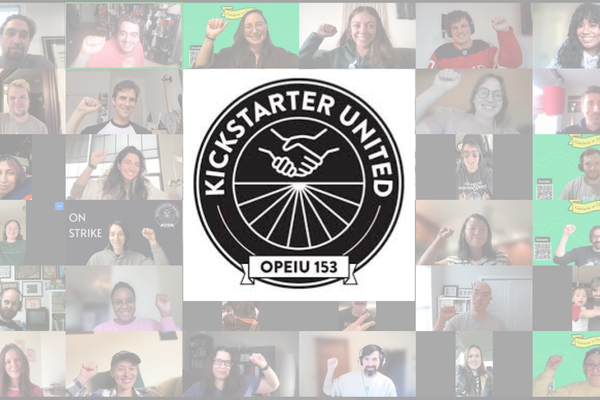Plus One Exp's Brandfox Saga
A tragic story of RPGs, facial hair, religion, and third-party logistics.

Most people first became aware of Tony Vasinda through streams and videos about indie tabletop games on his YouTube channel, Plus One Exp. Vasinda made quite a first impression — bright blue eyes, a mustache ever-so-slightly twirled at the edges, and a big grey beard. But even before he was “Chief Alchemist” at Plus One Exp, beards were Vasinda’s thing. Or rather, beard care. He ran a business called Catholic Balm Co, which sold beard care products. Already, we’ve touched on three major elements of this story — RPGs, facial hair, and religion — that will come back again and again. The fourth and final element might seem the least glamorous but that's only because it definitely is: it’s third-party shipping and logistics.
In 2022, Vasinda joined Brandfox, a logistics company that boasts of being “one of the top 50 US 3PL companies for 2025.” Brandfox is the brainchild of Courtney Abel, a man who was ostensibly following in the footsteps of his logistics magnate and multimillionaire father. Abel’s company took over Vasinda’s businesses in 2022, including Plus One Exp. Soon, Vasinda was bringing in game designers and publishers who were looking for logistics partners to help them print, ship, and sell books. But things went wrong almost immediately: poor service, slow communication, missed payments, and more. A revolving door of CFOs throughout 2023 didn’t help. It proved financially disastrous for many of the designers and publishers involved. After a little more than a year, Vasinda quit.
In July 2025, Brandfox filed for Chapter 11 bankruptcy, meaning they are seeking the ability to restructure themselves and their liabilities to avoid closing down entirely. Facing declining business from their biggest clients, unpaid bills, and untenable warehousing fees, the company’s back now seems to be against the wall. Brandfox are, by all accounts, a small logistics company, but next to their tabletop clients, they’re a giant. What happens when ants sign contractual agreements with an elephant?
Vasinda first met Abel in the mid-2010s. Catholic Balm Co was essentially being run from Vasinda's home in Seattle, which became increasingly difficult as the business grew. Abel was the managing director of Majestic Works at the time and was in the middle of turning it into “a leading Christian e-commerce platform” in his own words (assuming LinkedIn counts). According to Vasinda, Majestic Works offered to handle all their logistical needs, from running their website to shipping products, in exchange for a percentage of total revenue. “They were actually super affordable,” Vasinda told Rascal in an interview. “Twelve percent for doing all these things. A great deal for anybody who is in a creative space or is a gentler soul who doesn't necessarily want to have to deal with all the horrible realities of supply chain logistics.”

While Vasinda might’ve been ready to see the back of supply chain logistics, it wasn’t done with him. A couple of months after onboarding, he started receiving a horde of angry messages from customers, accusing him of stealing their money. “Basically no product had been fulfilled for about two months,” he said. When Vasinda reached out to Abel, he met with silence. He later learned that Abel and the company had parted ways. The situation didn’t improve and eventually Vasinda cut ties, bringing everything back in-house (quite literally in this case). His business diminished, his reputation tarnished, and his stock damaged, Vasinda swore to never work with third-party logistics companies again.
Smash-cut to 2019, and Vasinda ran into Abel again at an industry sales event. Vasinda claims he first tried to avoid a messy confrontation, but Abel seemed to genuinely want to apologise and so eventually sat down with him. Abel explained his side of the story, saying that he had been summarily dismissed from his job at Majestic Works one day and that most of the staff had walked out with him. He had then started his own company, Brandfox. Vasinda accepted his apology and was ready to end the conversation there, but then Abel made him an offer that seemed too good to be true: full-service logistics management, as promised by Majestic Works, but the first three or four months would be free as a way of making amends for past mistakes. Also, importantly, he could break the contract for free any time during the first year — letting him walk away whenever he wanted, no strings attached.
Vasinda didn’t immediately say yes. But the prospect of another Christmas spent packing and shipping products from his home loomed ominously. “When we decided to move from Seattle to Philly, I did remember that they were in Pennsylvania, and I looked at how close Harrisburg and Philly were. It's like an hour and a half away,” said Vasinda. “Worst case scenario, I can drive an hour and a half out and pick up all the stuff. So, we'll give them a try. We'll see what goes.”
Unlike last time, everything goes very well. At first.
Brandfox set up a webstore, moved stock into their warehouse, and started handling new orders smoothly. “It seems like all the things that we were promised originally are now happening under this new model,” said Vasinda. Brandfox grew quickly, expanding from 5,000 to 25,000 square feet. They partnered with Shopify to gain new customers. Everything was going well. Even the COVID-19 pandemic didn’t affect them. In 2020, in the face of increased shipping and e-commerce, logistics companies generally weathered the storm. This smooth and untroubled period continued for two years.
In the meantime, Vasinda found he had more time on his hands and became more interested in indie RPGs. He started a YouTube channel, Plus One Exp, and designed his first game. When it came to selling it, he naturally added it to his catalogue of products with Brandfox. It was not very different from shipping beard balms, after all. As Plus One Exp gained a reputation, Vasinda streamed indie games from small creators, made a few videos showcasing specific titles, and even published other people’s creative work. He seemed to enjoy this more. “Honestly, I'm more excited about the indie game side of things. The conspicuous consumptive piety is such a weird space to operate in,” said Vasinda.
It didn’t help that the balm business was slowly declining. In 2022, after Russia invaded Ukraine, an already pandemic-strained global supply chain was stressed even further. Vasinda ultimately made the decision to sell Catholic Balm Co. While he looked for buyers, he informed Brandfox about the situation — restocking was going to be slow. The response from Abel caught him off guard. Abel offered to buy the entire business and hire Vasinda as an employee.
It took a while to agree on terms, but eventually, in August 2022, Vasinda sold Catholic Balm Co to Brandfox and joined their team as director of business development. He also took Plus One Exp’s burgeoning RPG business with him. “If I'm gonna move one in, it makes sense to move both, right? I don't wanna do another job, I'd rather just do one,” said Vasinda.
Through the end of 2022, Vasinda connected a number of designers and publishers to Brandfox’s services. Some were publishers who were going to get the same deal he was: a percentage of revenue in exchange for handling everything from ecommerce to warehousing and fulfillment. This included Possum Creek Games, the publisher of Wanderhome and Yazeba’s Bed and Breakfast, as well as Stockholm Kartell, the publisher of Mork Borg. Others just needed the warehousing and shipping services, like Maxwell Lander. Sometimes they were fulfilling an entire crowdfunding campaign as was the case for WF Smith’s Barkeep on the Borderlands and Richard Ruane’s Moonlight on Roseville Beach.
And a third category were solo designers signing “print partnerships”. This included people like KeganExe, Adira Slattery, and Kyle Tam. Vasinda’s goal with these deals was to emulate the model of Exalted Funeral, who work with creators to produce, print, and sell their games through their webstore.
But almost as soon as these deals were signed, things once again started to go wrong.







